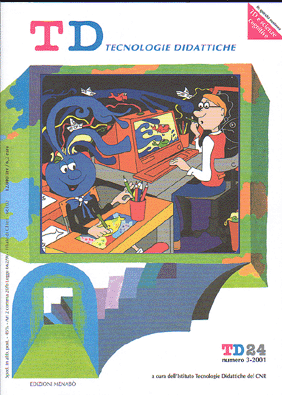Le ICT per un'Educazione Orientata all'Autonomia (EOA)
Contenuto principale dell'articolo
Abstract
Dettagli dell'articolo
Sezione
Gli autori che pubblicano su questa rivista accettano le seguenti condizioni:
- Gli autori mantengono i diritti sulla loro opera e cedono alla rivista il diritto di prima pubblicazione dell'opera, contemporaneamente licenziata sotto una Licenza Creative Commons CC BY 4.0 Attribution 4.0 International License.
- Gli autori possono aderire ad altri accordi di licenza non esclusiva per la distribuzione della versione dell'opera pubblicata (es. depositarla in un archivio istituzionale o pubblicarla in una monografia), a patto di indicare che la prima pubblicazione è avvenuta su questa rivista.
- Gli autori possono diffondere la loro opera online (es. in repository istituzionali o nel loro sito web) prima e durante il processo di submission, poiché può portare a scambi produttivi e aumentare le citazioni dell'opera pubblicata (Vedi The effect of Open Access).
Riferimenti bibliografici
Abbott J. (1994), Learning Makes Sense, Letchwoth, Education 2000.
Aviram A. (1993), Personal Autonomy and The Flexible School, International Review of Education, 39 (5), pp. 419-433.
Aviram A. (1998), Navigating Through the Storm, Massada, Tel Aviv (in ebraico).
Aviram A. (1999a), Three Views Concerning IT and Education (non pubblicato).
Aviram A. (1999b), Towards a “United Field Theory of Education Towards Autonomy” or A Suggestion for a New Educational Paradigm for Postmodern Democracies (non pubblicato).
Aviram A., Atias M., Bar-On N. (1995), School as a communication center or Distance learning as the foundation of education for autonomy, in Brunce A. (ed), Proceedings of the Open Classrom Conference, Oslo, September 1995 (in stampa).
Erikson E. H. (1963), Childhood and Society, Norton, New York.
Gray R. (1983), Mill on liberty: a defence, Routledge & Kegan Paul, London.
Hargraves A. (1994), Changing teachers, Changing times, Cassell, London.
Hook D. E. (1996), The Chaordic Organization: Out of Control and Into Order, New Horizons for Learning, Electronic Journal, September-October 1996.
Lilge F. (1975), The Abuse of Learning, Octagon Books, New York.
Maslow A. H. (1970), Motivation and personality, (2a ed.), Harper and Row, New York.
Mill J. S. (1947), On Liberty, Appleton-Century-Crofts, New York.
Papert S. (1991), Situating Constructionism, in Harel I. e Papert S. (eds) Constructionism, Ablex Publishing, Norwood, NJ.
Perlman L. (1992), School’s Out, William Morrow, New York.
Rogers C. R. (1961), On becoming a person: A therapist’s view on psychotherapy, Houghton Mifflin Co., Boston.
Rogers C. R. (1969), Freedom to learn. A view of what education might become, Merrill Books, Colombus, Ohio.
Swales M. (1978), The German Bildungsroman from Wieland to Hesse, Princeton University Press, Princeton.
The Center for Futurism in Education (1998), Today’s Stories, A project proposal approved by the I3 program of the European Community.
Winnicott D.W. (1971), Playing and Reality, Tavistock Publications, London.

